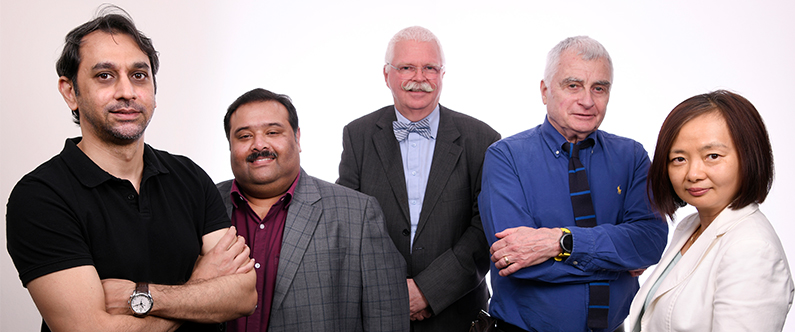WCM-Q researchers discover anti-cancer properties of a popular diabetes drug
 From left: WCM-Q researchers Dr. Yasser Majeed, Dr. Samson Samuel, Dr. Dietrich Büsselberg, Dr. Chris Triggle and Dr. Hong Ding have discovered the anti-cancer properties of a widely used diabetes drug.
From left: WCM-Q researchers Dr. Yasser Majeed, Dr. Samson Samuel, Dr. Dietrich Büsselberg, Dr. Chris Triggle and Dr. Hong Ding have discovered the anti-cancer properties of a widely used diabetes drug.
Researchers at Weill Cornell Medicine – Qatar (WCM-Q) are hoping they may have found a therapy for multiple types of cancer using a widely-used diabetes drug.
Writing in the journal Cancers, the scientists believe that the drug metformin may have anti-cancer properties when used in conjunction with other therapies.
Dr. Samson Samuel, research associate in physiology and biophysics at WCM-Q and lead researcher on the paper, said the investigation was initiated after it was noticed that diabetics who have been using metformin to control their condition have lower instances of certain types of cancer, namely breast cancer, colorectal cancer, pancreatic cancer and prostate cancer, all of which are of particular concern in the Middle East.
Work began to examine the phenomenon in the laboratory using cells, and was supported by the National Priorities Research Program grant (NPRP: 04–910-3–244), the Junior Scientist Research Experience Program grant (JSREP: 03–016-3–009), and a Basic Medical Research Program (BMRP) grant and pilot project grant, from Qatar National Research Fund, a member of Qatar Foundation. During the latter part of the study, the work was supported by the Bridge Funding Grants from the BMRP program at WCM-Q, a program funded by Qatar Foundation.
Dr. Samuel said: “We looked firstly at how the cells would respond to metformin, but we did not see a huge effect. However, when the cells were also starved of glucose, and then treated with metformin, we saw that the cells began to produce an anti-angiogenetic protein called thrombospondin-1.”
Angiogenesis refers to the formation of new blood vessels from the existing vascular system. Every part of the body needs a supply of blood to keep it fed and growing. When a tumor grows this also has to be fed by blood vessels, in a process called tumor angiogenesis. So, if this process can be inhibited or stopped, using an anti-angiogenetic drug, the tumor should either slow its growth or die.
However, Dr. Samuel said, physicians cannot completely starve a cancer patient of glucose, so instead the metformin was used in combination with the molecule 2-deoxyglucose which inhibits the utilization of glucose by the cells.
Working with the microvascular endothelial cells of mice – endothelial cells being those that line the inside of blood vessels – the research team found that the cells began to produce the anti-angiogenetic thrombospondin-1 when treated with a combination of 2-deoxyglucose and metformin. This effect was not seen in cells treated with either 2-deoxyglucose or metformin alone.
Dr. Chris Triggle, professor of pharmacology at WCM-Q and the lead principal investigator for the study, said: “This is really significant. People who are diabetic and overweight have a higher risk for developing cancer and so the fact that metformin also potentially has the ability to treat cancer as well as diabetes means that physicians may be able to address the extra risk by reducing the blood glucose levels in a patient”.
Dr. Samuel added: “We also now have to look at how metformin targets other types of cells; this study focused specifically on endothelial cells, but it will be interesting to see the effect – if any – that it has directly on, say, breast cancer cells.
“Finally, these results are of particular importance to the wider population because of the potential they hold for the treatment of cancer in general. Different therapies usually only target specific cancers – a breast cancer drug at a particular dosage may not work on another type of cancer, for example – but the drug combination of 2-deoxyglucose and metformin that we have used, owing to the production of the anti-angiogenetic protein thrombospondin-1 could allow us to target the tumor angiogenesis associated with a range of cancers. Drug combinations may also allow us to reduce the need for toxic drugs or allow us to reduce the quantity they are administered in.
“It is obviously too early to predict with any certainty, but it does offer hope for the future.”